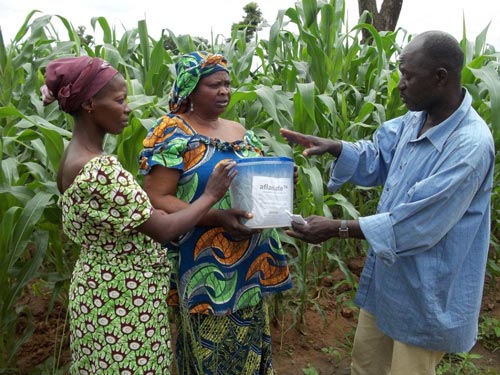 “All the maize for my home consumption comes from my aflasafe™-treated field,” says farmer Alhaji Al-Hassan from Nigeria’s Kaduna State. “When I take my maize to the market, buyers rush for it because the quality looks better. The grains look clean.”
“All the maize for my home consumption comes from my aflasafe™-treated field,” says farmer Alhaji Al-Hassan from Nigeria’s Kaduna State. “When I take my maize to the market, buyers rush for it because the quality looks better. The grains look clean.”
First developed by the USDA and adapted for use in Nigeria by the International Institute for Tropical Agriculture (IITA) and the African Agricultural Technology Foundation (AATF), aflasafe™ is fast gaining ground across Africa as a non-toxic and affordable solution to one of the continent’s most serious food safety issues.
Aflatoxins are invisible, tasteless poisons produced by Aspergillus flavus, a mould commonly found infecting crops such as maize and groundnut, both in the field and in storage. While acute exposure to aflatoxins can kill, prolonged exposure leads to impeded growth, liver disease, immune suppression and cancer with women, children and the poor and most vulnerable. Aflatoxins also impact international trade, with African economies losing US$450 million every year from barred exports.
Competitive exclusion
Aflasafe™ works by ‘pushing out’ harmful, toxin-producing strains of A. flavus from the field through the deliberate introduction of indigenous but non-toxic, harmless strains – a process known as ‘competitive exclusion’. Heat-killed sorghum grains are coated with the non-toxic fungal strains and scattered by hand in the field prior to crop flowering. Field tests in Nigeria between 2009 and 2012 showed that use of aflasafe™ consistently reduced aflatoxin contamination in maize and groundnut crops by 80-90%.
In 2012, these findings led to the adoption of the biocontrol product by several extension agencies in Nigeria. IITA is currently constructing a low-cost manufacturing facility at its Ibadan campus in order to optimize the production process for aflasafe™ so that it can be taken up by other developing countries. The facility, which will be able to produce up to five tons of aflasafe™ per hour will also test commercialization models. Market linkages between aflasafe™ users and quality conscious food processors are also being developed, in collaboration with the private sector. With aflatoxin-contaminated maize in poultry feed being a major risk to animal health, links are also being developed with poultry producers.
Spreading the science
The success of aflasafe™ has led to an expansion in biocontrol research in Burkina Faso, Ghana, Kenya, Mali, Senegal, Tanzania, and Zambia. In Kenya, IITA has identified four non-toxic strains of A. flavus in locally grown maize, which are now being used to make a Kenya-specific product called aflasafe™-KE01. Researchers from the Institute are currently gathering efficacy data to determine where the product will be deployed. “We are happy with the innovative scientific solution which has done well in Nigeria,” says Wilson Songa, Kenya’s agriculture secretary. “The ball is now in our court, and we shall move fast… We needed the technology yesterday!”
Senegal is also developing its own version – aflasafe™-SE01, and IITA is optimistic that both Kenya and Senegal will have their own fully registered versions of aflasafe™ in two years, with Burkina Faso reaching the same point in three years and Zambia in four. Meanwhile, at the 2012 G20 meeting in Mexico, G20 leaders announced that aflasafe™ will be one of three initial pilot projects to be supported under the ‘AgResults’ initiative which aims to incentivize the adoption of agricultural technologies by the poor.
Affordable technology
IITA’s experience in Nigeria suggests that the cost of aflasafe™ – at US$1.5 per kg, with a recommended usage of 10 kg per hectare – is affordable for most farmers in the country. The Institute calculates that adoption of biocontrol with other management practices will reduce aflatoxin contamination by more than 70% in maize and groundnut and increase crop value by at least 25%, as well as improving the health of women and children.
With mass production and commercialization of the technology now imminent in Nigeria, the country’s Minister of Agriculture and Rural Development, Hon. Akinwumi Adesina, has been enthusiastic in his support. “For too many years we have neglected to regulate aflatoxin in the production of food,” Adesina says. “IITA has worked tirelessly to control aflatoxin and educate farmers on the harmful effects of this toxin. When we consider the potential benefits of aflasafe™, it is ultimately smallholders who stand to gain the most,” he concludes.
The CRP MAIZE will be discussing the role of maize in Africa at the Africa Agriculture Science Week (15-20 July) on 16 July in Accra, Ghana. Join us if you can and follow the AASW Blog and #AASW6 on Twitter.
 Nutrition, health and food security
Nutrition, health and food security 
